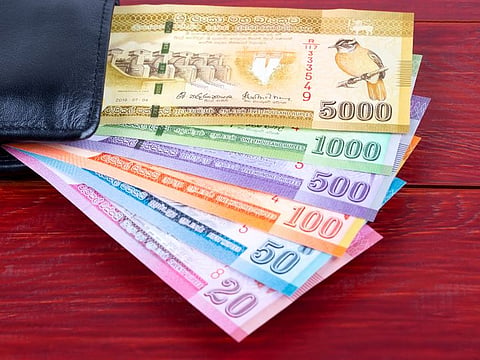Sri Lanka inches closer to IMF aid option after rupee plunge
$1 billion debt payment looms in four months

Colombo: Sri Lanka’s painful decision to effectively devalue its currency this week could pave the way for the island nation to get help from the International Monetary Fund as a $1 billion debt payment looms in four months.
The country’s dollar bonds due July 2022 gained 1.6 per cent on Wednesday to halt five days of losses, while the rupee advanced 0.3 per cent a day after plunging as much as 12 per cent - the most in more than four decades - in reaction to the central bank’s announcement that it was letting the currency float as international reserves dwindle.
The South Asian nation of about 22 million people has shunned a bailout from the IMF because of the strict conditions involved. The Washington-based lender said last week that Sri Lanka needs to urgently adopt a “credible and coherent strategy” to cope with its foreign-exchange crisis. Foreign currency reserves shrank to just $2.31 billion last month.
Tightening global credit conditions brought about by a hawkish Federal Reserve as well as higher fuel costs exacerbated by the war in Ukraine mean a more challenging environment for Sri Lanka. The war could also further hit tourism revenues as almost a quarter of all tourist arrivals into Sri Lanka this year were from Russia and Ukraine, while Russia was the third-biggest buyer of Sri Lankan tea over the past two years.
“The policy that Sri Lanka has taken aligns with some of the recommendations suggested by the IMF,” said Wang Ting Seah, country risk analyst at Fitch Solutions in Singapore. Negotiations with the lender will be easier “if Sri Lanka chooses to undergo an IMF programme,” he said.
The rupee had been trading in a narrow range of 201-203 per dollar since October as the central bank sought to rein in the fastest-growing consumer prices in Asia. Monetary authorities also raised interest rates for a second meeting last week.
“External help is inevitable,” said Carl Wong, head of fixed income at Avenue Asset Management in Hong Kong. “IMF will be the ultimate solution and this is another step closer to that,” he said, referring to the greater flexibility in the exchange rate.
Sign up for the Daily Briefing
Get the latest news and updates straight to your inbox



